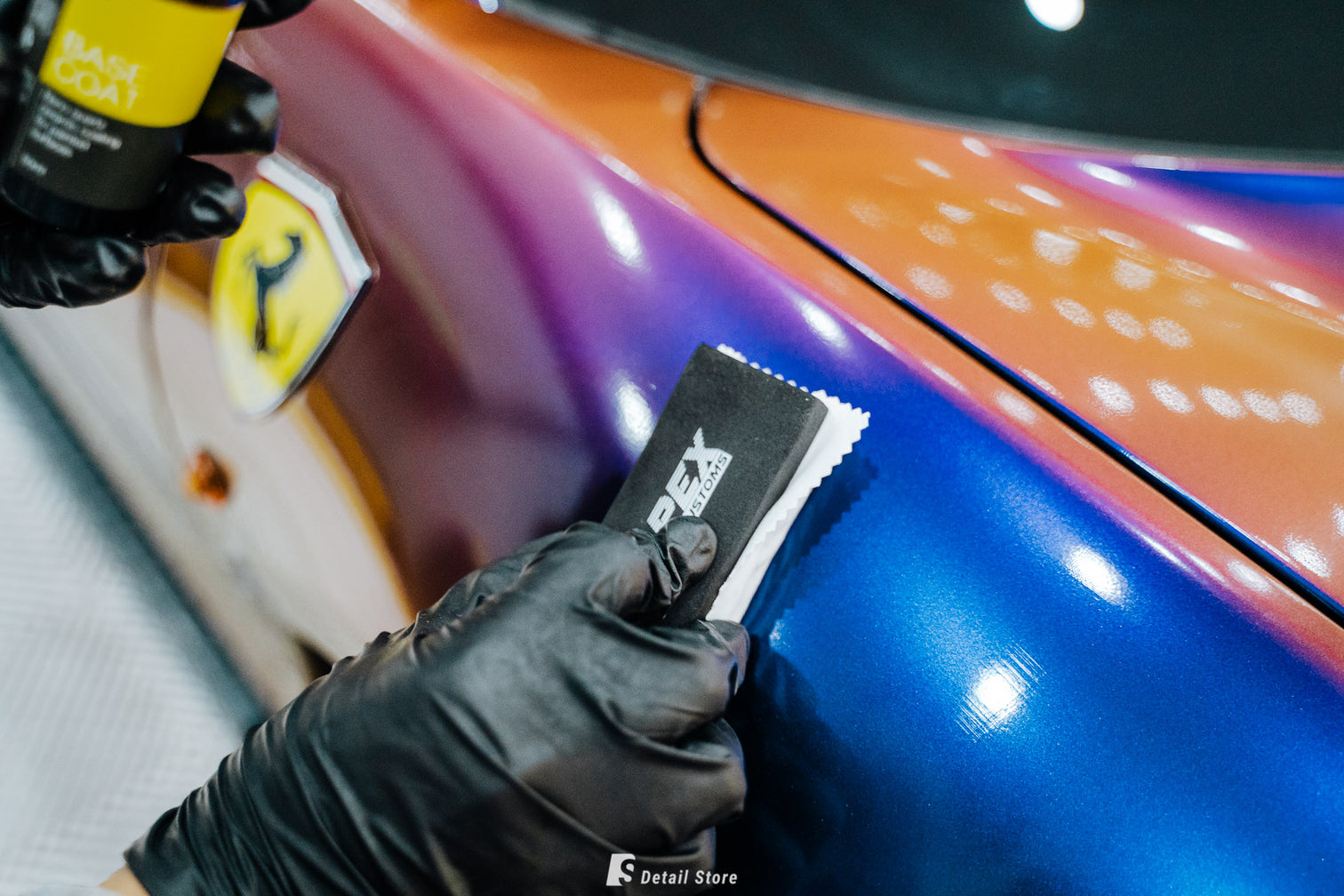Introduction
As a car enthusiast or someone passionate about keeping their vehicle in top condition, you’ve likely wondered about the best ways to protect your car’s paint.
With so many options—ceramic coatings, waxes, sealants, and paint protection films—understanding the benefits of each can be overwhelming.
Whether you want to enhance your car’s gloss or guard it against scratches and UV damage, knowing how these options stack up is key to making the right choice.
Let’s dive into the different types of paint protection to help you decide.
The Importance of Paint Protection
Your vehicle’s paint is constantly exposed to harsh environmental elements like
- UV rays,
- road debris,
- scratches and abrasions
- bird droppings
- and tree sap.
Without proper protection, these contaminants can cause fading, oxidation, scratches, and overall deterioration of your car’s appearance.
Paint protection acts as a barrier between your car’s delicate surface and these hazards, ensuring your vehicle retains its showroom shine while extending its lifespan.
Paint Protection Options
The main paint protection options available are:
- ceramic coatings, which offer long-lasting durability and water-repelling properties;
- waxes and sealants, providing a glossy finish and easy DIY application but with a shorter lifespan; and
- Paint Protection Film (PPF), a more expensive yet robust solution that shields against physical damage like scratches and chips.
Each option offers different levels of protection, depending on your budget and the amount of care you’re willing to put into maintaining your car’s finish.
Let’s understand each of them in detail.
Ceramic Coatings: What Are They?
Ceramic coatings are a liquid polymer solution applied to a vehicle’s paint, forming a durable, long-lasting protective layer. When the coating cures, it bonds with the paint, creating a strong barrier that repels water, dirt, and other contaminants.
Pros:
- Durability: Can last for several years with proper care.
- Hydrophobic Properties: Repels water and dirt for easier cleaning.
- UV Protection: Guards against fading and oxidation.
- Scratch Resistance: Offers light protection from minor abrasions.
Cons:
- Cost: More expensive than waxes or sealants.
- Application: Often requires professional installation.
Who Should Consider Ceramic Coating?
Ceramic coatings are ideal for car enthusiasts or anyone seeking long-term, low-maintenance paint protection. It’s perfect for those wanting to preserve their vehicle’s showroom shine without frequent reapplications, offering the best balance of protection and longevity.
Waxes and Sealants: The Classic Approach
What Are They?
Waxes (often natural) and sealants (synthetic) are traditional forms of paint protection that create a glossy barrier on the car’s surface. They enhance the vehicle’s shine while offering basic protection from environmental contaminants like dirt and water.
Pros:
- Affordable: Cost-effective and widely available.
- Glossy Finish: Adds a rich, deep shine to your vehicle.
- DIY-Friendly: Easy to apply without professional help.
Cons:
- Short Lifespan: Needs frequent reapplication (every few months or even weeks if driven daily).
- Less Durable: Doesn’t offer the same level of protection as ceramic coatings or PPF.
Who Should Consider Waxes and Sealants?
If you enjoy regularly maintaining your car and love that fresh waxed look, this is for you. Great for car enthusiasts on a budget or for those who want an easy DIY solution to enhance shine and get moderate protection.
Paint Protection Film (PPF): Maximum Armour
What Is It?
Paint Protection Film (PPF), also known as clear bra, is a thick, transparent film applied to the surface of your vehicle. It offers an unparalleled level of protection against physical damage like scratches, chips, and scuffs.
Pros:
- Unmatched Protection: Physically shields against rock chips, scratches, and even minor accidents.
- Self-Healing: Some PPFs have self-healing properties that erase minor scratches with heat.
- UV Protection: Guards against fading and oxidation.
Cons:
- Cost: One of the most expensive paint protection options.
- Installation: Requires professional application for best results.
- Aesthetic Concerns: May slightly alter the car’s appearance, and improper installation can cause bubbles or peeling.
Who Should Consider PPF?
Perfect for drivers who face harsh road conditions, PPF is ideal for those who want maximum physical protection. It’s especially great for high-end vehicles, off-roaders, and anyone looking to avoid expensive repairs from chips or scratches.
Comparing Paint Protection Options
To help you choose the best paint protection option for your vehicle, the table compares ceramic coatings, waxes & sealants, and paint protection film (PPF). Each option caters to different needs, balancing protection, cost, and ease of use.
| Feature | Ceramic Coatings | Waxes & Sealants | Paint Protection Film (PPF) |
| Durability | 2-5 years | 1-3 months | 5-10 years |
| Protection Level | High: UV, water, minor scratches | Moderate: Water, light UV protection | Very High: Physical damage, chips, scratches |
| Cost | Medium | Low | High |
| Ease of Application | Requires professional for best results | DIY-friendly | Professional installation recommended |
| Finish | Glossy, durable finish | High gloss, frequent reapplication needed | Maintains original look, minor appearance changes possible |
| Best For | Enthusiasts looking for long-lasting protection, weekend cars that don’t get driven much | Budget-conscious DIYers | High-end cars or harsh driving conditions |
Choosing the Right Paint Protection for Your Needs
When choosing the right paint protection for your car, here are some important questions to consider:
What’s your budget?
How often do you use your car, and in what conditions?
Do you live in a sunny climate, where UV protection is essential, or in harsher environments where physical protection is a priority?
And finally, how much time are you willing to spend on maintenance?
Consider these factors, think about what your lifestyle is like and the answers will help guide you toward the best protection option for your needs.
Conclusion:
There’s no doubt that protecting your car’s paint is crucial for maintaining its appearance and value. Choosing the right paint protection option is just as important as the protection itself.
By considering your budget, driving habits, and the level of care you’re willing to invest, you can select the best solution that meets your specific needs.
Whether you go for the durability of ceramic coatings, the ease of waxes, or the high-level protection of PPF, making the right choice will keep your car looking its best for years.
Need more guidance? Check out some of our paint protection guides and get started.
-

Calvin brings a wealth of experience across multiple engineering disciplines, including chemical, mechanical, and electrical engineering. His in-depth knowledge of filtration systems and hydraulic pumps has positioned him as an expert in the pressure washer product category. With a unique combination of technical expertise and business insight, Calvin excels at solving complex challenges and driving innovation, particularly in the car detailing industry.
-

Aaron is a passionate car detailing enthusiast who channels his expertise and love for pristine vehicles into engaging blog content for a leading detail store website. With a keen eye for detail and a wealth of knowledge about the latest products and techniques, Aaron provides invaluable insights and tips to fellow car enthusiasts. His dedication to achieving showroom-quality results and his ability to explain complex processes in an easy-to-understand manner make his blog a go-to resource for anyone looking to elevate their car detailing game.

